Bournemouth U’s Sascha Dov Bachmann (EBC) and Prof Joachim Sanden (Germany, Luneburg) presented a paper on National Security and Public Health at the IALS – SAS in London (http://events.sas.ac.uk/events/view/15689). Their topic “The Right to Liberty and Security, Public Health and Disease Control”uses the examples of the Escherichia coli (E. coli O157) outbreak in Surrey in August 2009 and the EHEC-O104:H4 outbreak 2011 in Germany by Fenugreek Sprouting seeds, to discusses potential human rights implications of food safety hazards across the food chain (see the European crisis management according to Art. 10 of EC regulation 178/2002 and the U.K. Public Health (Control of Disease) Act 1984, the Public Health (Infectious Disease) Regulations 1988 and the Food Safety Act 1990). Both authors also touched upon potential legal vacuums and loopholes around public and civil safety and security when dealing with new health and environmental threats such as Avian or Swine influenza (flu), which can lead – especially if used as a potential means of bioterrorism – to a national health and security crisis and even mutate into an international pandemic. Consequently, any emergency responses by a state can also directly affect human rights.
/ Full archive
Recent developments in public engagement in research from the National Institute for Health Research

The National Institute for Health Research (NIHR) have recently made a number of developments to improve public and patient involvement in health and social care research. Please see the main points summarised below.
NIHR Strategic Plan for Public Participation and Engagement in Research
On 20 May 2014, the NIHR published a five year strategic plan ‘Promoting a research active nation’ setting out a new programme to encourage public engagement and participation in health, social care and public health research. The plan is a direct response to the opportunity to widen research participation in the population following the passage of the Health and Social Care Act 2012.
The document sets out a range of initiatives including the ‘Ok to ask’ campaign that the NIHR will support to grow the number of people taking part in research.
NIHR make it clear campaign
As of the 14th May 2014 researchers who apply for NIHR funded research will be required to produce a good quality plain English summary.
INVOLVE have been working with the NIHR Programmes and other key stakeholders to:
- review and develop the question and guidance for plain English summaries in NIHR funded research which are part of the Standard Application Form
- develop criteria and propose methods for assessing the quality of plain English summaries
Please see the briefing document or the NIHR ‘make it clear’ campaign website for more information.
Breaking boundaries: thinking differently about public involvement in research
Over almost a decade, patients, carers and members of the public have contributed to the work of NIHR by helping it to decide what research to fund and how it should do this.
NIHR is now inviting views and comments on how it can build on its achievements in public involvement so far to create the sort of active collaboration between the public, researchers and clinicians essential to the delivery of its future ambitions for research and a healthier nation. Of particular interest will be the innovations, ideas and new approaches that will help it break new ground in this important area.
They are inviting anyone and everyone to comment including patients, carers, service users, clinicians, and researchers. Complete the online questionnaire or have a look at the website for more ways to contribute. Responses should be submitted by 12 noon on Thursday 26th June.
People in research website
The original development of People in Research in 2007 was led by INVOLVE on behalf of the UK Clinical Research Collaboration.
The site has a searchable database of opportunities, and researchers can register for the site and add their own projects to the database. These are checked by INVOLVE staff before they go live to ensure that they meet quality standards.
In 2014, INVOLVE redesigned the website to make it more streamlined and user friendly. An advisory group, including members of the public were involved in designing, developing and piloting the site.
Access the website at http://www.peopleinresearch.org/.
International Clinical Trials Day (ICTD) 20th May 2014
 International Clinical Trials Day (ICTD) is celebrated around the world on or near the 20 May each year, to commemorate the day that James Lind started his famous trial on the deadly disease scurvy. It provides a focal point to raise awareness of the importance of research to health care, and highlights how partnerships between patients and healthcare practitioners are vital to high-quality, relevant research.
International Clinical Trials Day (ICTD) is celebrated around the world on or near the 20 May each year, to commemorate the day that James Lind started his famous trial on the deadly disease scurvy. It provides a focal point to raise awareness of the importance of research to health care, and highlights how partnerships between patients and healthcare practitioners are vital to high-quality, relevant research.
On International Clinical Trials Day 2014 the NIHR and its NHS partners promoted the fact that it’s ‘OK to ask’ about clinical research. The ‘OK to ask’ Facebook site has details of the ICTD events that were held across the country. The BU Clinical Research Unit (BUCRU) were lucky enough to be invited along to Poole Hospital’s event where we had the opportunity to chat to patients and staff keen to get involved with research.
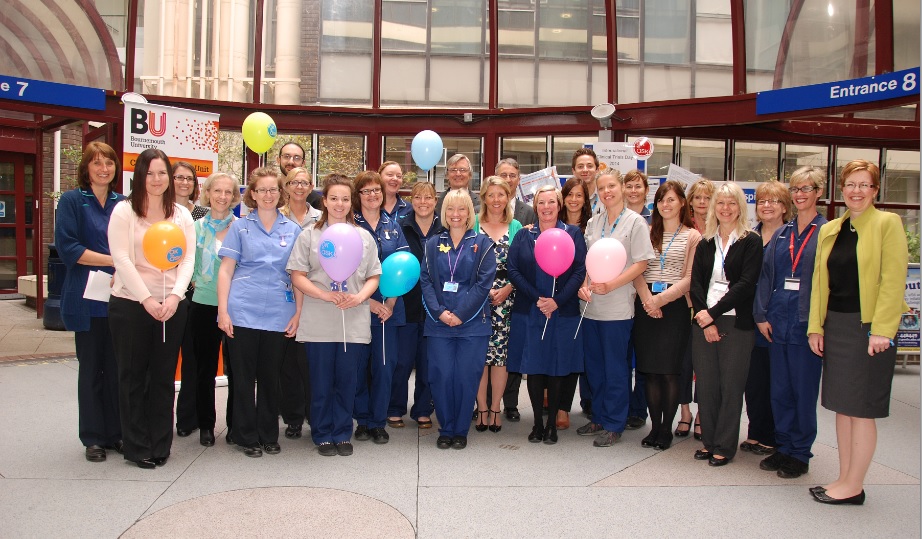
Don’t forget, your local branch of the NIHR Research Design Service is based within BUCRU on the 5th floor of Royal London House. Feel free to pop in and see us or send us an email.
Media and Information Literacy
BU’s Dr Julian McDougall is the author of one of a series of influential reports on the state of media education in Europe, being released today at UNESCO at the First European Forum on Media and Information Literacy.
The 29 independent reports provide valuable insight into the state of media education.
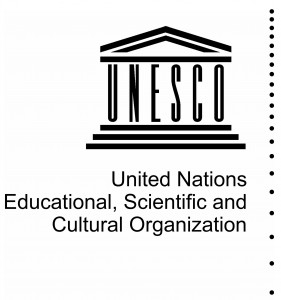 Dr McDougall said: “The UK report presents a paradox. Whilst the UK still leads the way in the media education curriculum, with established courses from secondary to higher education, we are trailing our European neighbours in policy mandate, political support, teacher training and funding for the broader project of providing media and information literacy as an entitlement for all citizens, as described in the UNESCO declaration.”
Dr McDougall said: “The UK report presents a paradox. Whilst the UK still leads the way in the media education curriculum, with established courses from secondary to higher education, we are trailing our European neighbours in policy mandate, political support, teacher training and funding for the broader project of providing media and information literacy as an entitlement for all citizens, as described in the UNESCO declaration.”
External assessments are key to improving Media and Information Literacy in Europe as the rapidity of digital transformations requires radical policy changes. The reports focus on the policy frameworks, the action plans for capacity building and the role of engaged stakeholders. The main findings will be disclosed at UNESCO together with a set of recommendations and a Declaration on “Augmented MIL in the Digital Era”.
The First European Forum on Media and Information Literacy is a joint effort with UNESCO and the European Commission.
The complete list of experts and their national reports can be accessed and downloaded at www.translit.fr
3rd edition of ‘Evaluating Public Relations’ published
The third edition of the enduring public relations text, Evaluating Public Relations, has been published by Kogan Page. Much revised by authors Professor Tom Watson (Media School) and former lecturer Paul Noble, the book has greater emphasis on the measurement of social media and concepts of value created by that communication.
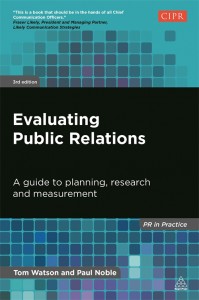 “When the first edition of Evaluating Public Relations came out in 2005, it mostly dealt with the measurement of media relations activity”, Professor Watson said. “In it, we included a chapter on how to measure PR-influenced coverage on a no- or low-cost basis. An updated version is included in the latest edition.
“When the first edition of Evaluating Public Relations came out in 2005, it mostly dealt with the measurement of media relations activity”, Professor Watson said. “In it, we included a chapter on how to measure PR-influenced coverage on a no- or low-cost basis. An updated version is included in the latest edition.
“But the world of PR practice has moved on and so the book includes the measurement and evaluation of social media, more focus on outcomes rather than outputs, and advice to meet increasing demands that PR/communication delivers value to the organisation.”
Professor Watson said that the new edition calls for PR/communication practitioners to take “a big step forward in the planning and strategy-setting processes.”
“Not only should communication objectives align with organisational objectives, but practitioners must ensure that communication is part of the organisation or client’s own objectives.”
The third edition includes new and revised chapters based on Professor Watson’s research into the history of PR measurement and his work, with Professor Ansgar Zerfass of Leipzig University, on methods of performance management in PR/communications.
Wordcamp UK coming to Bournemouth this July
 Wordcamp 2014 Bournemouth
Wordcamp 2014 Bournemouth
Saturday 12 – Sunday 13 July
Executive Business Centre, 89 Holdenhurst Road, Bournemouth BH8 8EB, United Kingdom.
Fancy yourself a WordPress enthusiast? This two day, participant driven, conference is this year being hosted by Bournemouth University and Silicon South in its first official trip to the South West. One of the key aspects of this event is that the agenda is built online by participant proposed sessions as part of a multi-track agenda, so if you’ve got some nifty WordPress tricks up your sleeve you can propose a session share these with other experts.
Now is your chance to get involved, click on the links to find out more about proposing a session (50 or 25 minutes) or a 5 minute lightning talk or just to register yourself for a £10 early bird ticket. This conference is a chance to build on your WordPress skills and meet community of developers.
If you’re planning to get involved in this event we’d love to hear about it so please do send us an email at siliconsouth@bournemouth.ac.uk
The case for Open Access within a university…
…is not simply political or economic or professional. It needs to rest in the notion of what a university is and what it should be … It is central to the university’s position in the public space”
Professor Martin Hall, Vice Chancellor of the University of Salford, UK
A few weeks back we were privileged to welcome experts on the topic of Open Access to speak at Bournemouth University (BU) in an event well attended by delegates from HEIs across England, Scotland and Wales. BU’s Open Access Event was enjoyed by all who attended and over a series of blog posts I hope to summarise some of the key points raised by each of the speakers. We also filmed the event and will be posting the films shortly for all to watch, enjoy and comment upon.
So to part one of the day, after a wonderful introduction by our Chair and self-acknowledged novice of Open Access Professor Iain McRury, we welcomed Alma Swan to the floor…
Alma Swan is a consultant working in the field of scholarly communication. She is a director of Key Perspectives Ltd, Director of Advocacy for SPARC Europe, and Convenor for Enabling Open Scholarship, an organisation of university managers around the world that promotes the principles of open scholarship and open science. She is also a director of the Directory of Open Access Journals and of the umbrella organisation Infrastructure Services for Open Access. She holds honorary academic positions in the University of Southampton School of Electronics & Computer Science and the University of Warwick Business School.
Alma lead the introductory address framing the day in a presentation titled ‘The benefits of Open Access’. She began the presentation looking at what open access is:
- Immediate
- Free (to use)
- Free (of restrictions)
- Access to the peer-reviewed literature (and data)
And what it is not:
- Not vanity publishing
- Not a ‘stick anything up on the Web’ approach
- Moving scholarly communication into the Web Age
She posed the question of openness using Tim Berners-Lees CERN proposal for an Information Management System (later to become the world-wide- web), drawing attention to his bosses Mike Sendall comments “Vague but exciting…” 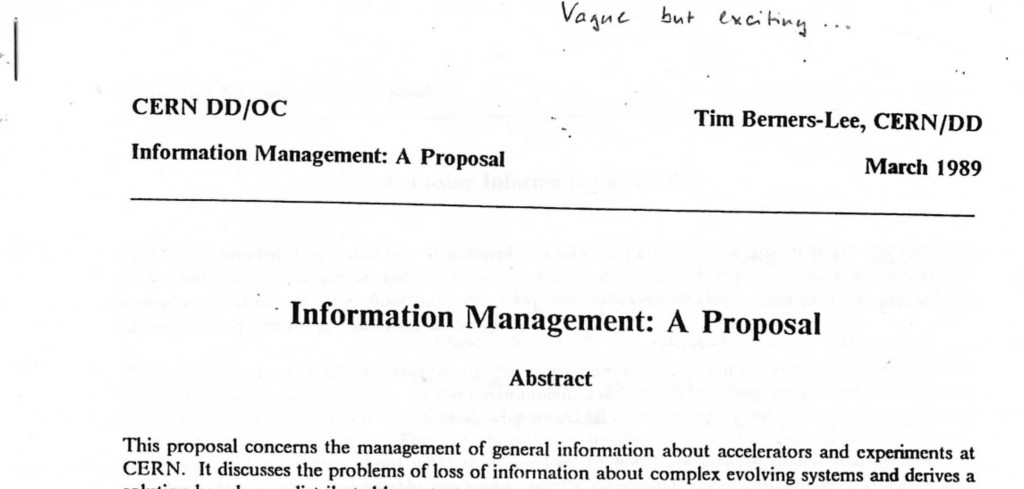
As an aside there’s a great blog article on Tim Berners-Lees opinions on the Open Agenda here – http://blog.digital.telefonica.com/2013/10/09/tim-berners-lee-telefonica-open-agenda/ if your interested! Any how, back to the matter in hand…
Alma covered the basics of Open Access highlighting BUs repository BURO, she addressed the disciplinary differences in approaches to Open Access. On average across all disciplines 37% of articles are made Open Access, rising to just under 50% in Mathematics and as low as 20% in the Arts.
She then took us through the advantages to authors for making their outputs Open Access:
1. Improves author visibility
Alma gave a number of testimonials from authors however, here we include Professor Martin Skitmore’s from School of Urban Design, Queensland University of Technology (QUT):
“There is no doubt in my mind that ePrints [repository] will have improved things – especially in developing countries such as Malaysia … many more access my papers who wouldn’t have thought of contacting me personally in the ‘old’ days.
While this may … increase … citations, the most important thing … is that at least these people can find out more about what others have done…”
2. Increases usage
We viewed download statistics from a number of institutional repositories – the University of Liege’s repository ORBi has approximately 70,000 references with full text and in April 2014 had just under 100,000 downloads. The University of Salford’s repository USIR has c.9000 records and clocked up over 45,000 downloads in January 2013 alone. In regards, to individual authors we returned to Martin Skitmore (QUT) who had 225,857 downloads and 4858 in the past 28 days!
It is also worth noting the usage of repositorys globally. MIT’s repository usage stats presented in the below map was particularly interesting:
3. More impact
From a citation perspective Open Access can increase citation impact by between 36 to 250% depending on the discipline. She highlighted the difference in citations from OA and non-OA publications across 3 disciplines; Engineering (shown here), Clinical Medicine and Social Sciences all showed significant increases in citations.
Alma then went on to show the advantages for institutions to make Open Access mandatory, she also posed many topical questions and highlighted thought provoking research. One aspect which struck me in particular, was an analysis of PubMed Centrals unique users which revealed that only 25% of articles were accessed by Universities and the majority 40% were accessed by citizens:
- 25% universities
- 18% government and others
- 40% citizens
- 17% companies
Fittingly Alma ended with a quote from Daniel Coit Gilman the First President of Johns Hopkins University in 1878:
“It is one of the noblest duties of a university to advance knowledge and to diffuse it, not merely among those who can attend the daily lectures, but far and wide. “
Full slides from Alma Swans presentation at Bournemouth University’s Open Access Event on the 7th May 2014 are available here internally.
Latest Major Funding Opportunities
The following opportunities have been announced. Please follow the links for more information:
BBSRC and NERC invite proposals for both research and research translation projects to the first call of the Sustainable Agriculture Research & Innovation Club (SARIC). Approximately £5M of funding is available for this call, divided between research grants (£3.5M) an d research translation grants (£1.5M). A workshop for both calls will be held on 18/06/14 at the Royal Academy of Engineering, London. The closing date for the Research Translation grants is 4pm on 29/07/14. The closing date for the Outline Research grant proposal is 11/09/14.
d research translation grants (£1.5M). A workshop for both calls will be held on 18/06/14 at the Royal Academy of Engineering, London. The closing date for the Research Translation grants is 4pm on 29/07/14. The closing date for the Outline Research grant proposal is 11/09/14.
Following the BBSRC‘s first phase of the Multidisciplinary Synthetic Biology Research Centres (SBRCs) call in 2013, which established three SBRCs, the call will shortly be launched for phase two. This call has been developed by the RCUK Synthetic Biology Working Group. It is anticipated that the opening date will be in late May, with a closing date in July.
The EPSRC‘s Collaborative Computational Projects (CCPs) bring together the major UK groups in a given field of computational research to tackle large-scale scientific software development projects, maintenance, distribution, training and user support. They play an important role in EPSRC’s ongoing ability to deliver its Software as an Infrastructure strategy and as community based networks and projects they provide a focal point for communities to identify their scientific software requirements and take a strategic approach to software support in a particular field. Subject to quality, up to £2M of funding and 15 FTEs per annum of technical computational support from staff at STFC’s Scientific Computing Department is available to support new and existing Collaborative Computational Projects (CCPs) that underpin research and research communities within the EPSRC remit. Closing date: 4pm on 27/10/14.
The MRC wishes to encourage applications to all MRC research boards, particularly at programme-level, for “systems medicine”: using systems approaches in medical research to build on the research & training foundations laid by other research councils, and encourage a wider range of applications applying systems approaches to medical research – “systems medicine”. For closing dates, please consult the specific Research Board’s deadline date.
The MS Society and the MRC may jointly fund applications identified as a priority by the MS Society. Applications will be assessed in open competition across the MRC’s range of funding schemes. Please see the website for further information.
Nesta, in collaboration with the TSB, has announced the opening of the 2014 Longitude Prize, where the public is invited to vote (22-25 May) on the most pressing problems of our time. In September 2014, applications will be invited for the winning challenge. A total fund of £10m will be available.
NERC, under the Valuing Natural Capital scheme, is seeking to fund research that will help understanding of the implications for natural capital and the provision of ecosystem services of a range of future energy scenarios. These including scenarios that are compatible with the UK’s energy policy challenges of maintaining energy security, keeping energy affordable and cutting greenhouse gas emissions by 80 per cent by 2050. NERC, working closely with the UK Energy Research Centre (UKERC) and its Valuing Nature programme, will be running a two-day interactive strategic ideas brokerage workshop to develop research consortia that will subsequently submit grant proposals to address this challenge. This Announcement of Opportunity is a call for participants for the ideas brokerage workshop, which will take place on 21-22 July 2014 at Warwick Conferences. Closing date: 9am on Monday 16/06/14.
The TSB is to invest up to £3m to support the development of innovations that will enable the use and integration of data to improve the stratification of patients with neurodegenerative diseases and the provision of business models to, for example, support repositioning of currently available drugs on the basis of stratification for treatment of neurodegenerative diseases. Proposals must be business-led and collaborative. This is a two-stage competition that opens for applicants on 27 May 2014. The deadline for registration is noon on 02/07/14 and the deadline for expressions of interest is noon on 09/07/14. The deadline for projects invited to submit a full-stage application is noon on 09/10/14. A briefing event for potential applicants will be held in London on 10/06/14.
The TSB is to invest up to £6m in collaborative R&D projects that stimulate innovation in the UK digital health sector. The aim of this competition is to support projects with novel ideas for health informatics – specifically, using data to address healthcare needs within a hospital setting. Collaborations that focus on one or more of the following areas – accident and emergency (A&E), planned specialist care, health analytics and connected care are welcome. The funder is seeking proposals that will make secondary care more efficient and empower care providers, patients and their families. Applications should also explore how health informatics can revolutionise existing therapies and services and also be an enabler for those that would not exist without digital technology. Proposals must be collaborative and business-led although project partners can include research and non-profit organisations as well as other businesses. Applicants must register by 25/06/14 with the deadline for expressions of interest being noon on 02/07/14. A briefing event for potential applicants will be held in London on 28/05/14.
The TSB, on behalf of the Home Office, is inviting applications for projects which help to identify substitutes for, or additives to, potentially harmful chemicals, to make them non-viable for dangerous and illegal purposes, without hampering their legitimate uses. A briefing event will be held on Tuesday, 10/06/14 in Central London. Applicants must register by 16/07/14 with full applications to be submitted by 23/07/14.
Please note that some funders specify a time for submission as well as a date. Please confirm this with your RKE Support Officer.
You can set up your own personalised alerts on ResearchProfessional. If you need help setting these up, just ask your School’s RKE Officer in RKE Operations or see the recent post on this topic, which includes forthcoming training dates up to November 2014.
If thinking of applying, why not add notification of your interest on ResearchProfessional’s record of the bid so that BU colleagues can see your intention to bid and contact you to collaborate.
PGR Development Fund Activity Report by Nada Sherief: SciTech
About Me
I am Nada Hany Sherief, a 2nd year Part-time PhD Student in Computing at the Faculty of Science and Technology.
The Conference (EASE 2014)
EASE’14, the International Conference on Evaluation and Assessment in Software Engineering, is one of the top conferences in the area Software Engineering (CORE Rank: A). This year, EASE was held on 12-14 May, in London, UK.
The Papers
I have submitted two papers to EASE’14. The first is titled by “Crowdsourced Software Evaluation”, and was accepted in the New Ideas track. The second is titled by “Software Evaluation via Users’ Feedback at Runtime” and it was accepted in the Doctoral Symposium of the conference.
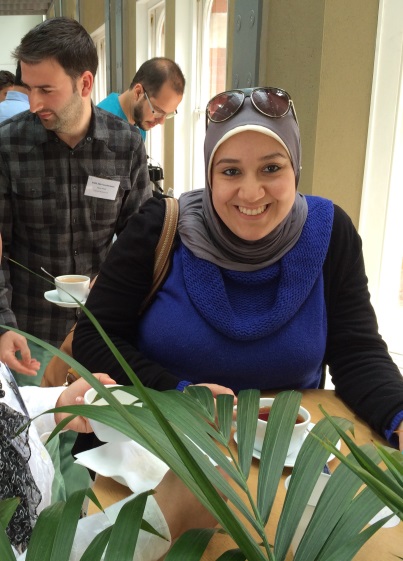
The Benefits
The PGR Development Funds from BU enabled me to attend EASE’14, which was an ideal place to launch the new idea of my research and have it discussed with colleagues and experts in the empirical software engineering community.
The research idea of a socialized software evaluation was found very interesting. Both presentations discussed the preliminary results of my research. Also, I presented several research challenges that are not yet addressed in the literature, and could be a starting point for future work not only in my research but also in the wider scope of the community.
This participation has added several skills to me. On the personal side it gave me a good motivation and confidence to continue my work in that area. It also gave our research more visibility in the research community. On the research side, I have gained much feedback about how to enhance and better frame my work which will certainly consolidate my PhD experience.
Acknowledgement
I would like to thank the Graduate School at Bournemouth University for their PGR Development Fund which sponsored this activity which had very positive impact on my PhD journey.
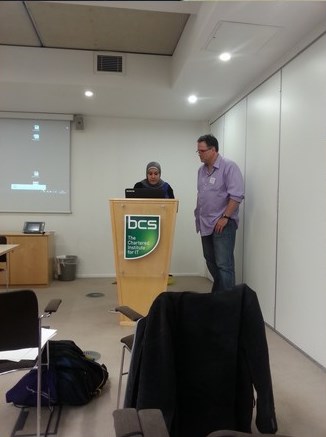
PGR Development Fund Activity Report by Malik Almaliki: SciTech
The International Working Conference on Requirements Engineering: Foundation for Software Quality (REFSQ) is one of the leading international forums in the area of Requirement Engineering for software systems. My main activity was to present a full research paper at this conference which was held in Essen, Germany, April 7-10, 2014. The paper was titled “Requirements-driven Social Adaptation: Expert Survey” and was collaboratively written with colleagues from University of Birmingham.
In this research paper I disseminated a part of my findings of the first year of my PhD. It reports on the results of a two-phase Expert Opinion study that was conducted to identify core benefits, domain areas, styles of use and challenges for the socially-adaptive software and users’ feedback acquisition. The study involved around 30 experts in Requirement Engineering and Adaptive Systems which also helped us to know how our vision in the area is perceived by the wider community.

The Graduate School PGR Fund provided me with a great opportunity to attend the REFSQ’14 conference and get my work published and recognized. Being able to participate in REFSQ’14 was one of the distinguished events in my PhD journey. It played a significant role in increasing my motivations and confidence and giving my research a visibility in such a well reputed venue. The reviews of the paper and the feedback given by REFSQ’14 attendees were invaluable and, together with the constructive feedback and critiques, helped me preparing well for the transfer exam which went very well. This activity consolidated my presentation and communication skills.
I would like to thank the Graduate School for this PGR Development Fund which enabled me to have this great opportunity. Participation at REFSQ’14 was a huge motive that pushed me step further towards a successful PhD journey.
PG Researcher Development Workshops
 WHAT’S ON in June 2014
WHAT’S ON in June 2014
- Introduction to Bournemouth Research Information & Network (BRIAN) – 4 June
- Managing Pressure Positively – 10 June
- Nvivo (Day 1) Introduction – 16 June
- Nvivo (Day 2) Advanced – 17 June (attendance Day 1 is mandatory – to register your interest in this workshop – please email pgrskillsdevelopment@bournemouth.ac.uk). Numbers are restricted
- Importance of Publishing – 18 June
- Introduction to Case Studies – 24 June
Full details and sign up lists are available via myBU (Graduate School PGR Community).
Don’t forget that if you have both staff and student email accounts, you’ll need to log on with your student username and password. Please check your student email account for email reminders.
Join us for a seminar on ‘Understanding Crowdsourcing and CCTV surveillance’
 Staff and students are invited to join us for today’s Cyber Security Seminar…
Staff and students are invited to join us for today’s Cyber Security Seminar…
‘Understanding Crowdsourcing and CCTV surveillance’
Tuesday, 27th May
Coyne Lecture Theatre
4pm – 5pm
Closed Circuit Television (CCTV) has many different uses but is often considered an archetypal surveillance technology. These infrastructures generate large amounts of data; so much so that the technique of crowdsourcing has recently been applied to the problem of searching for abnormalities in live surveillance video; the premise being that many inexpert watchers are cheaper but as efficient as a small number of experienced security experts. However, the merits of crowdsourcing watchers of surveillance video are largely unknown.
In this talk Dr. Paul Dunphy will describe exemplar infrastructures of this type, and two user studies that assess the performance of the watchers of CCTV video online. The results prompt a discussion regarding the effectiveness of using crowdsourcing in such contexts, and the role such infrastructures can play in society.
Speaker Bio: Paul is a postdoctoral researcher in the Culture Lab at Newcastle University. He is interested in multi-disciplinary approaches to understand and design security and privacy technologies.
If you would like to join us for this presentation, please book your place via Eventbrite.
AHRC Collaborative Doctoral Awards Call: internal competition
The AHRC expect universities to exercise demand management for the AHRC Collaborative Doctoral Awards call and therefore a special Research Proposal Review Service (RPRS) has been convened.
Therefore, colleagues wishing to submit an application to this call should adhere to the following time scale:

Colleagues are reminded of the following:
- Throughout the development of their proposals, they should be liaising with RKE operations to ensure all the relevant costings and other bid information is developed in a timely manner.
- Adherence to AHRC guidance is crucial. In particular, colleagues should note that partnership working is especially important feature of this call. Notably from the guidance, the non-HEI partner is required to provide supervisory time and desk space as in-kind contributions. A written agreement is seen as essential for this partnership working alongside regularly reviewed project plans.
HSC postgraduate student speaks at Canadian Conference
Pratik Adhikary spoke about his Ph.D. research at the American Canadian Conference for Academic Disciplines (Toronto: 19-22 May 2014). Pratik presented the key findings from his thesis under the title ‘Health status and health risks to Nepalese migrant workers in the Middle East and Malaysia’.
Pratik is originally from Nepal and he conducted his research with male migrant workers who were returning to Nepal for definite or for a holiday/break. He is supervised by Dr. Steve Keen and Prof. Edwin van Teijlingen both in HSC.
Pratik’s study has been supported by Bournemouth University, the PGR Development Fund and the Open Society Foundations.
Edwin van Teijlingen
CMMPH
Sustentabilidade nas Universidades; Reflections on ERASMUS mobility – a personal and professional development opportunity
I have just returned from an ERASMUS training visit (to share and develop approaches for sustainable development) at the University of Beira Interior (UBI), Covilhã, Portugal. Such a rewarding experience!
Located on the slopes of Serra da Estrela, Covilhã looks out on a fertile valley, framed by mountains – a beautiful location, largely unfamiliar to people from the UK.
The city was once regarded as the ‘Portuguese Manchester’ for its long tradition in the wool industry and textile production, however like other textile towns production ceased, people moved away, and the social and economic consequences for the region were immense.
The University has brought new life to the area and is working towards enhancing the sustainability of the region. One of the most interesting characteristics of UBI is its focus on recovering the abandoned buildings that were formally part of the industrial production process and creating a better environment; retaining historical, cultural and architectural value, while developing sustainable educational facilities has been an important goal.
During my trip I had the opportunity to visit the various sites, give presentations and meet with colleagues. The University has five Faculties (Science, Engineering, Human & Social Sciences, Arts & Letters, and Health Sciences).
Particularly interesting was the tour of the University Wool Museum which is integrated into the science building, and reveals the archaeological structures of the early production process, sets out the historical development of technology, and provides insights on industrialisation. I came away from the tour, thinking of the various ways that this facility could be used to enhance learning for students on any course, not just those interested in science and technology. The motto of the museum “The Threads of the past weaving the future” left me thinking that when we focus on sustainable development, we often emphasise ‘future generations’ but we must also acknowledge and learn from the past.
My visit to the Rectory (housed in the former Convent of Santo António and their equivalent of OVC) also left me thinking. Firstly, they have made a fantastic job of restoration and conversion; they really could do with some students (as motivated as BU students) to reclaim the lovely terraces. Olive and fruit trees are largely over-grown; the space cries out to be developed as a sustainable garden. Secondly, they have made great use of space in the former chapel, however where the choir would formerly have sat, is now where doctoral candidates are judged – the jury type seating made it seem a really intimidating space compared to a room in Christchurch House, to defend a Thesis. And lastly, if I was a member of the senior team in such an idyllic spot, I would probably not be able to resist the urge to get out a hoe and create a vegetable plot – however the urge to just sit in the sun and admire the view, would also be strong!
It is always interesting to meet new colleagues, learn from their perspectives, and to talk with students. The students I presented to during my visit (on Sustentabilidade nas Universidades) were very impressed with what we are doing in the UK, and at BU, to address sustainability. They had lots of questions; later their tutor reported that not only were they were interested to know more but were also challenging her as to why BU students seemed to have a better experience. Some were very keen to come to Bournemouth.
Overall, I came away feeling enriched and with new perspectives. I would recommend an ERASMUS visit to others. Okay the paperwork can seem bureaucratic at first glance but don’t be put off, the rewards are high. I have published four co-authored papers as a result of my first ERASMUS visit; more collaborative outputs will follow. Further, the opportunity to develop broader cultural perspectives on research interests, enhance your language capability and to evaluate how higher education operates in another country is personally and professionally rewarding.
If you would like to make contacts at UBI please get in touch. I would be happy to help.
BUDI attends the Alzheimer’s 2014 Care Show in London
 Bournemouth University Dementia Institute (BUDI) was represented at the Alzheimer’s care show held at the Olympia in London on Friday 16th and Saturday 17th May 2014. This is a large event at which organisations and businesses showcase what they offer for people with dementia and those who support them. Dr Fiona Kelly, Dr Rick Fischer and Clare Cutler were kept busy at their stand, made distinctive by its brightly coloured banners and tulips. Delegates to our stand heard about the training and awareness work we do, our research, particularly into creating sustainable dementia friendly communities and our consultancy, including advising on dementia friendly design. Dr Kelly’s presentation on Achieving Excellence in Dementia Care stimulated interest both in the topic and in the work we do at BUDI to promote good practice.
Bournemouth University Dementia Institute (BUDI) was represented at the Alzheimer’s care show held at the Olympia in London on Friday 16th and Saturday 17th May 2014. This is a large event at which organisations and businesses showcase what they offer for people with dementia and those who support them. Dr Fiona Kelly, Dr Rick Fischer and Clare Cutler were kept busy at their stand, made distinctive by its brightly coloured banners and tulips. Delegates to our stand heard about the training and awareness work we do, our research, particularly into creating sustainable dementia friendly communities and our consultancy, including advising on dementia friendly design. Dr Kelly’s presentation on Achieving Excellence in Dementia Care stimulated interest both in the topic and in the work we do at BUDI to promote good practice.
BUDI’s 2014 Open Pubilc Meeting
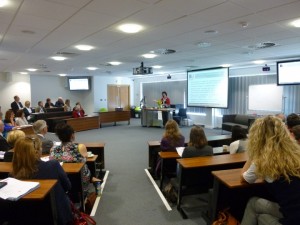 Bournemouth University Dementia Institute (BUDI) held its third open meeting at the university on 14th May, with this year’s theme being dementia friendly environments. The day was well attended by practitioners, family carers, the general public and people with dementia. It started with a lovely buffet lunch sponsored by Alzheimer Research UK, providing an opportunity for delegates to network and to browse the information stands hosted by themselves and BUDI Ph.D. students. The open meeting was formally opened by Professor Gail Thomas who praised the innovative work being carried out by the BUDI team. Delegates then heard presentations from Dr Fiona Kelly on dementia friendly design, Dr Jan Wiener on the use of eye tracking technology to explore navigation skills and difficulties, Kathrin Büter on using computer technology to support dementia friendly design in hospitals. This session closed with a presentation by architect Niall McLaughlin on his work with communities and older people to design care homes that meet everyone’s needs and are inspirational, therapeutic spaces. The final part of the day involved a question and answer session where delegates and presenters discussed some of the issues raised during the day including how to ensure that the concept of good design filters down to those commissioning, designing and using buildings that people with dementia also use. This successful event is sure to have got people thinking and sharing some of what they heard and we look forward to holding similar events in the future.
Bournemouth University Dementia Institute (BUDI) held its third open meeting at the university on 14th May, with this year’s theme being dementia friendly environments. The day was well attended by practitioners, family carers, the general public and people with dementia. It started with a lovely buffet lunch sponsored by Alzheimer Research UK, providing an opportunity for delegates to network and to browse the information stands hosted by themselves and BUDI Ph.D. students. The open meeting was formally opened by Professor Gail Thomas who praised the innovative work being carried out by the BUDI team. Delegates then heard presentations from Dr Fiona Kelly on dementia friendly design, Dr Jan Wiener on the use of eye tracking technology to explore navigation skills and difficulties, Kathrin Büter on using computer technology to support dementia friendly design in hospitals. This session closed with a presentation by architect Niall McLaughlin on his work with communities and older people to design care homes that meet everyone’s needs and are inspirational, therapeutic spaces. The final part of the day involved a question and answer session where delegates and presenters discussed some of the issues raised during the day including how to ensure that the concept of good design filters down to those commissioning, designing and using buildings that people with dementia also use. This successful event is sure to have got people thinking and sharing some of what they heard and we look forward to holding similar events in the future.
Übersetzen: Translation of the MGI in German
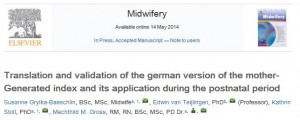
The Mother-Generated Index (MGI) is a validated tool to assess postnatal quality of life. It was originally designed and tested by Dr. Andrew Symon (http://nursingmidwifery.dundee.ac.uk/staff-member/dr-andrew-symon) at the University of Dundee. This instrument is usually administered several weeks or months after birth and correlates with indices of postpartum mood states and physical complaints. The instrument had not been translated into German before or validated for use among German-speaking women, nor have the results of the tool been assessed specifically for the administration directly after birth. Our recent paper (Susanne Grylka-Baeschlin, Edwin van Teijlingen, Kathrin Stoll and Mechthild Gross) in Midwifery describes the systematic translation process of the MGI into German and to assess the convergent validity of the German version of the instrument directly after birth and seven weeks postpartum
Susanne Grylka-Baeschlin, as part of a European COST Action, has spent time at Bournemouth University’s Centre for Midwifery, Maternal and Perinatal Health. Susanne Grylka-Bäschlin is a Swiss midwife based at the Hannover Medical School, Germany, who studies cultural differences in postnatal quality of life among German-speaking women in Switzerland and Germany.
Prof. Edwin van Teijlingen
CMMPH
Foot Lab: Call for Volunteers
 How unique is a human footprint? What is the variability in a person’s footprint? How do human footprints vary with body mass?
How unique is a human footprint? What is the variability in a person’s footprint? How do human footprints vary with body mass?
These are just some of the questions that Professor Matthew Bennett is currently exploring and needs volunteers to help with his research.
He is looking for three types of volunteer:
- Any adult – staff or student – who would be prepared to walk barefoot in a tray of sand leaving a dozen footprints and have their weight, height and age recorded. Some of you may remember doing this for a previous experiment back in 2007 and are encouraged to take part again. It takes no more than ten minutes and all the data, including digital scans or your footprints, are stored anonymously and cannot be traced back to you.
- Any adult – staff or student – who is prepared to donate about an hour of their time to leave multiple barefoot tracks in the sand tray. We are looking for at least a hundred tracks per individual and this will involve you walking up and down the sand tray multiple times while we scan your tracks.
- Any children accompanied by their parents (staff or student) of any age, from those that have just learnt to walk, to those that are approaching 17 years old. Some parents will have already seen that the Talbot Campus Nursery is involved and their children may be participating via that route.
The experiments have full ethical clearance from BU and you will receive full particulars and be asked to sign a consent form for yourself and for your children should they wish to get involved. All the data will be held anonymously and no individual will be identifiable from their data. The data will only be used to generate scientific results and publications.
The Foot Lab will be open to the public as part of the Festival of Learning 2014 on the 9 and 10 June, but the lab is open for BU staff and students from 27 May to 20 June. It is located on the Talbot Campus in in CAG01a. Email Matthew Bennett to book a time for yourself, a group of colleagues, or for you and your children to come in.
Most times of the day (Monday to Friday) can be accommodated especially if you are bringing in children and may be able to open the Foot Lab for small groups at the weekend. For those studying or working on the campus the Foot Lab will normally open for two slots a day (Monday to Friday) between 10am and 11.30am and again in the afternoon between 3.30pm and 5pm.

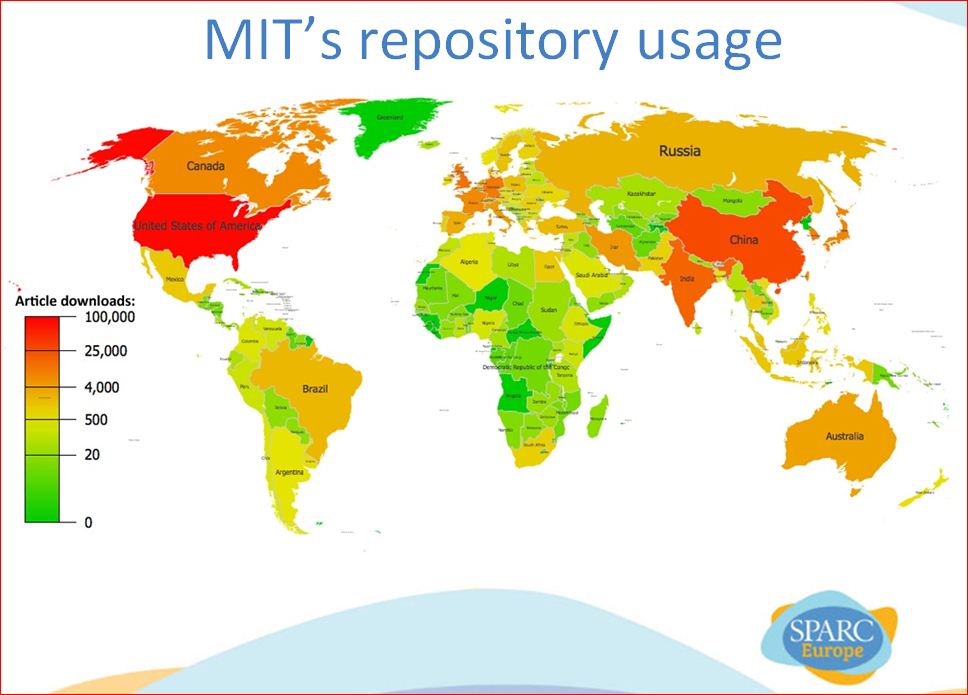
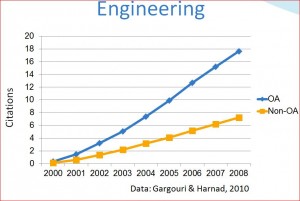

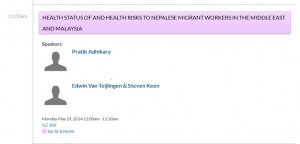

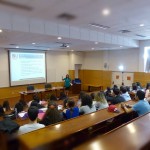












 SPROUT: From Sustainable Research to Sustainable Research Lives
SPROUT: From Sustainable Research to Sustainable Research Lives BRIAN upgrade and new look
BRIAN upgrade and new look Seeing the fruits of your labour in Bangladesh
Seeing the fruits of your labour in Bangladesh Exploring Embodied Research: Body Map Storytelling Workshop & Research Seminar
Exploring Embodied Research: Body Map Storytelling Workshop & Research Seminar Marking a Milestone: The Swash Channel Wreck Book Launch
Marking a Milestone: The Swash Channel Wreck Book Launch ECR Funding Open Call: Research Culture & Community Grant – Application Deadline Friday 12 December
ECR Funding Open Call: Research Culture & Community Grant – Application Deadline Friday 12 December MSCA Postdoctoral Fellowships 2025 Call
MSCA Postdoctoral Fellowships 2025 Call ERC Advanced Grant 2025 Webinar
ERC Advanced Grant 2025 Webinar Update on UKRO services
Update on UKRO services European research project exploring use of ‘virtual twins’ to better manage metabolic associated fatty liver disease
European research project exploring use of ‘virtual twins’ to better manage metabolic associated fatty liver disease